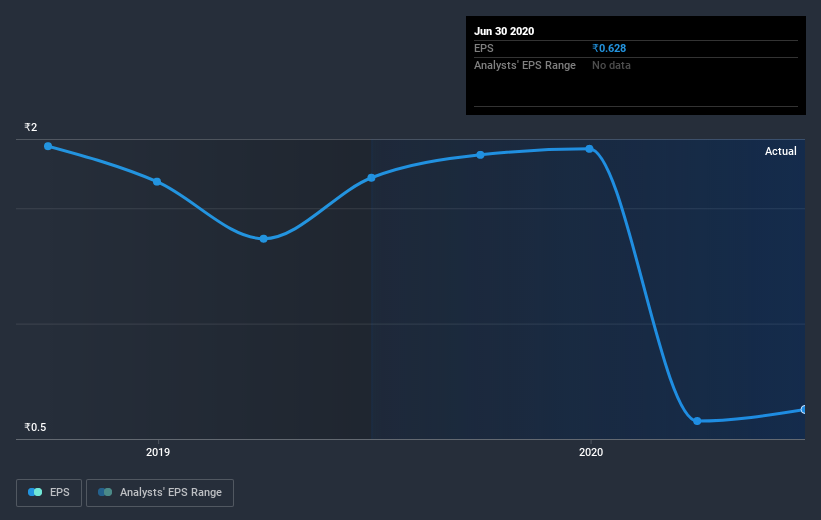South Indian Bank's (NSE:SOUTHBANK) Stock Price Has Reduced 79% In The Past Three Years

As every investor would know, not every swing hits the sweet spot. But you have a problem if you face massive losses more than once in a while. So spare a thought for the long term shareholders of The South Indian Bank Limited (NSE:SOUTHBANK); the share price is down a whopping 79% in the last three years. That would be a disturbing experience. And the ride hasn't got any smoother in recent times over the last year, with the price 36% lower in that time. The falls have accelerated recently, with the share price down 17% in the last three months.
View our latest analysis for South Indian Bank
While markets are a powerful pricing mechanism, share prices reflect investor sentiment, not just underlying business performance. By comparing earnings per share (EPS) and share price changes over time, we can get a feel for how investor attitudes to a company have morphed over time.
During the three years that the share price fell, South Indian Bank's earnings per share (EPS) dropped by 37% each year. This change in EPS is reasonably close to the 40% average annual decrease in the share price. So it seems that investor expectations of the company are staying pretty steady, despite the disappointment. In this case, it seems that the EPS is guiding the share price.
You can see how EPS has changed over time in the image below (click on the chart to see the exact values).

Dive deeper into South Indian Bank's key metrics by checking this interactive graph of South Indian Bank's earnings, revenue and cash flow.
What about the Total Shareholder Return (TSR)?
We've already covered South Indian Bank's share price action, but we should also mention its total shareholder return (TSR). Arguably the TSR is a more complete return calculation because it accounts for the value of dividends (as if they were reinvested), along with the hypothetical value of any discounted capital that have been offered to shareholders. Dividends have been really beneficial for South Indian Bank shareholders, and that cash payout explains why its total shareholder loss of 78%, over the last 3 years, isn't as bad as the share price return.
A Different Perspective
South Indian Bank shareholders are down 36% for the year, but the market itself is up 6.7%. However, keep in mind that even the best stocks will sometimes underperform the market over a twelve month period. Unfortunately, last year's performance may indicate unresolved challenges, given that it was worse than the annualised loss of 10% over the last half decade. We realise that Baron Rothschild has said investors should "buy when there is blood on the streets", but we caution that investors should first be sure they are buying a high quality business. While it is well worth considering the different impacts that market conditions can have on the share price, there are other factors that are even more important. To that end, you should learn about the 3 warning signs we've spotted with South Indian Bank (including 1 which is is a bit concerning) .
For those who like to find winning investments this free list of growing companies with recent insider purchasing, could be just the ticket.
Please note, the market returns quoted in this article reflect the market weighted average returns of stocks that currently trade on IN exchanges.
When trading South Indian Bank or any other investment, use the platform considered by many to be the Professional's Gateway to the Worlds Market, Interactive Brokers. You get the lowest-cost* trading on stocks, options, futures, forex, bonds and funds worldwide from a single integrated account. Promoted
New: Manage All Your Stock Portfolios in One Place
We've created the ultimate portfolio companion for stock investors, and it's free.
• Connect an unlimited number of Portfolios and see your total in one currency
• Be alerted to new Warning Signs or Risks via email or mobile
• Track the Fair Value of your stocks
This article by Simply Wall St is general in nature. It does not constitute a recommendation to buy or sell any stock, and does not take account of your objectives, or your financial situation. We aim to bring you long-term focused analysis driven by fundamental data. Note that our analysis may not factor in the latest price-sensitive company announcements or qualitative material. Simply Wall St has no position in any stocks mentioned.
*Interactive Brokers Rated Lowest Cost Broker by StockBrokers.com Annual Online Review 2020
Have feedback on this article? Concerned about the content? Get in touch with us directly. Alternatively, email editorial-team@simplywallst.com.
About NSEI:SOUTHBANK
South Indian Bank
Provides various banking products and services in India.
Undervalued with adequate balance sheet.
Similar Companies
Market Insights
Community Narratives




